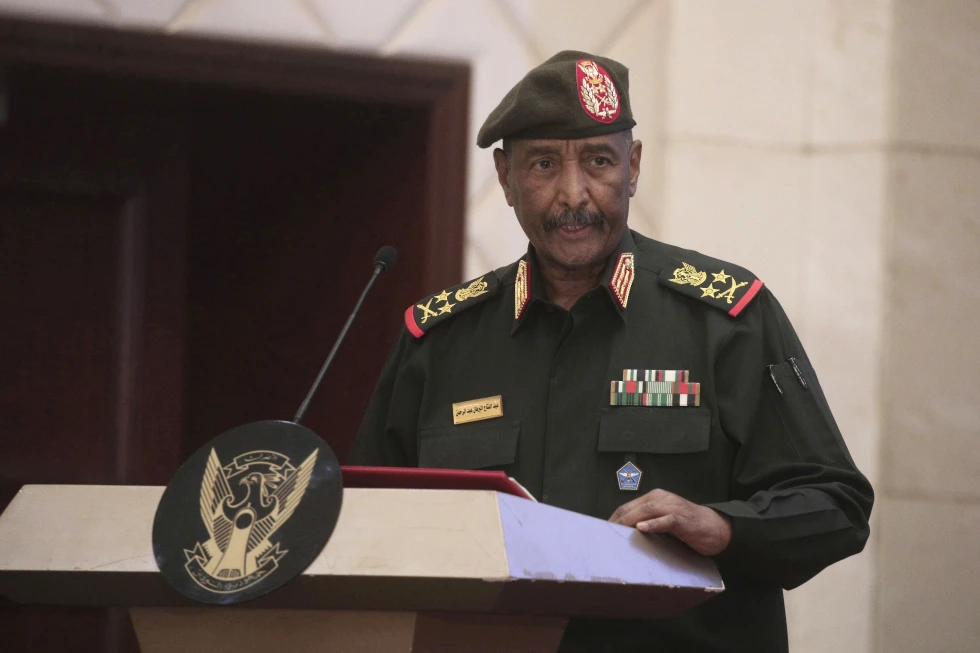Sudan’s army chief traveled to Qatar on Thursday for talks with the country’s emir, making his third international trip since fighting broke out between the military and a rival paramilitary force in mid-April, media reports said.
Sudan plunged into chaos almost five months ago, when long-simmering tensions between the military, led by Gen. Abdel Fattah Burhan and the Rapid Support Forces, commanded by Mohamed Hamdan Dagalo, escalated into open warfare on April 15.
During the visit, Burhan and the Qatari emir, Sheikh Tamim bin Hamad Al Thani, discussed the challenges facing conflict-stricken Sudan. The talks took place in the Qatari capital, Doha, according to a statement by the Emiri Diwan media outlet.
Al Thani reiterated his call for broad peace negotiations between all of Sudan’s political forces and a lasting stop to the fighting, the statement said.
Sudan’s acting Foreign Minister Ali al-Sadiq and Gen. Ahmed Ibrahim Mufadel, head of the General Intelligence Authority, accompanied Burhan on the trip, Sudan’s state run SUNA news agency said.
The visit comes amid a flurry of similar diplomatic meetings convened in Egypt and South Sudan, where Burhan held talks on Monday with South Sudan’s president, Salva Kiir.
Last week, the general met with Egyptian President Abdel Fattah el-Sissi in the Egyptian coastal city of el-Alamein, in Burhan’s first trip abroad since Sudan’s conflict erupted. Few details were made public about either trip.
The fighting in Sudan is estimated to have killed at least 4,000 people, according to the U.N. human rights office. Activists and doctors on the ground say the toll is likely far higher.
Burhan’s trip to Qatar occurred a day after the United States imposed sanctions on RSF’s deputy leader, Abdel-Rahim Hamdan Dagalo, for alleged acts of violence and human rights abuses committed by the paramilitary troops. Abdel-Rahim is the brother of Mohammed Hamdan Dagalo, the RSF’s leader.
In a statement Thursday, the RSF condemned the sanctions, which block all U.S. property and entities owned by Abdel-Rahim Dagalo.
It denounced the measure as “a purely political decision that was taken without an accurate and transparent investigation.”
Also Thursday, in a rare televised interview on Sky News Arabic, Abdel-Rahim Dagalo also criticized the sanctions as unfair and tried to deflect the blame for rights abuses onto the army.
In the western region of Darfur — the scene of a genocidal campaign in the early 2000s — the nearly five-month conflict has morphed into ethnic violence, with rights groups and the United Nations accusing the RSF and allied Arab militias of attacking ethnic African groups.
“For four years we have been working hard to solve the Darfur problem, to solve the tribal problems,” Abdel-Rahim Dagalo told Sky News Arabic.
He said that Burhan and figures from the former administration of Islamist leader Omar al-Bashir were the real drivers of ethnic violence in Darfur and have been arming certain ethnic groups. Al-Bashir, who ruled Sudan for 30 years, was deposed in popular uprising in 2019.
Since April, the fighting has displaced more than 5 million people, according to the most recent figures by the U.N.’s International Organization for Migration.
Despite international efforts, the conflict has shown few signs of easing. Formal peace negations mediated by the U.S. and Saudi Arabia in the kingdom’s coastal town of Jeddah were adjourned in late June with both mediators publicly calling out the Rapid Support Forces and the army for continually violating agreed-to truces.
There have been at least nine cease-fires between the army and the RSF since the fighting broke out. All were violated.

